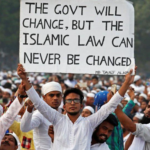
There are many who wield Sharīʻa law as a lethal weapon in their war on individual freedoms and their aggression against human rights
– refusing to set a minimum age for marriage, criminalizing the right to abortion, and expressing reservations on the principle of the equality between the sexes at work, while traveling and driving, in marriage, or the like.
BY SAID NACHID
BUT WHAT, FIRST OF ALL, is the Sharīʻa? I should say, at the outset, that Sharīʻa is not what the Qur’ān says or the what the Messenger said, but it refers specifically to that jurisprudential endeavour that lasted more than a thousand years, during which time the jurists attempted to derive from the Qur’ānic text (and in addition the sayings and actions of the Messenger) general laws and universal legislation. For centuries, jurists have set out to explore the areas in the Qur’ānic Text where there is a silence on lawmaking, and attempt to force these silences to speak, from their claim that the Qur’ān ‘has said all there is to say’.
But the question is: Did the Qur’ān actually say everything there was to say? Or at least, does it contain within his folds the possibility of speaking about everything, so as to leave us nothing to do but give voice to its spaces and its silence?
Answering ‘yes’ to this constitutes the founding myth of Islamic jurisprudence, of Sharīʻa, and consequently the theological closure and religious extremism.
What is more, since giving voice to Qur’ānic text was insufficient to the task, even by using analogy (qiyās) according to criteria that remained unclear and ill-defined, the Sunnī jurists added to the corpus the sayings and actions of the Messenger and those of the Companions as well. In this way, the circle of legislative sources expanded to include, in addition to the Qur’ān, tens of thousands of words and deeds of the Messenger, and hundreds of thousands of words and deeds of the Companions and Followers (for the Sunnis) and the Infallible Imams (for the Shīʽa).
Even if this expansion of the circle of sources for legislation did not itself provide an inexhaustible textual stock to devise universal legislation covering the calamities of all times and places, then the jurists also soon founded the mechanism of analogy. Once again, there was no agreement on what the specific criteria or controls for this analogy were to be. It left the question: on what are we to base our analogies, and by what right?
Just to try this out, let us take any sūra. Let us take, for example in Sūrat al-Takāthur :
Abundance distracts you (verse 1)
Until you come to the graves (verse 2). [1]
What are the possibilities here for applying analogy in order to derive a binding law?
Let us give it a try: By analogy with the first verse, I can devise a law for birth control, claiming that reproduction distracts people from the truth! And by analogy with the second verse, or both together, I can devise a general law that prohibits people from visiting cemeteries!
The Text stipulates that the reason for visiting graves should not be to show off the abundance of the living or the dead, or of both! I might affirm – taking into account the reasons for the revealed verses – that any census of the population must not be conducted, and I might also affirm that the census should include the living but not the dead, or I might affirm that one must not conduct a census only for the purpose of vaunting abundance! All of this is thanks to the process of analogy. But the basic question remains: By what right do I seek to derive from this verse a legal ruling that is to be valid for every time and place?
Maintaining that the Qur’ān said everything there was to say constitutes the founding myth of Islamic jurisprudence
The very fact of making the Qur’ān speak like this itself indicates that there is no absolute law valid for every time and place, whether by means of an analogy or without one, given that the Qur’ānic Text says: for every one of you did We appoint a law and a way.[2]
In the end, the employment of analogy has produced judgments that are not only absurd, not only contrary to the most basic values of human rights, but more than that the Qur’ān is made to say what it does not say or express something contrary to what it actually says.
We have some examples of this. There are acts, for instance, for which the Qur’ānic Text has stipulated otherworldly punishments, without specifying for these any worldly punishment. Yet the majority of jurists have deduced – by analogy with punishments in the Hereafter – the necessity of worldly punishments as well – such as apostasy from Islam, for example.
There are also rituals that the Qur’ān made voluntary, yet the jurists have made them obligatory. Moreover, they have agreed, in this present age, that abandoning them should incur punishment. Like fasting. On this the Qur’ānic verse says:
O you who believe! Fasting is prescribed for you, even as it was prescribed for those before you, that you may ward off (evil); For a certain number of days; but whoever among you is sick or on a journey, then (he shall fast) a (like) number of other days; and those who are not able to do it may effect a redemption by feeding a poor man, so whoever does good spontaneously it is better for him; and that you fast is better for you if you did but know.[3]
However, according to the strict proclivities of the jurists during the era of decadence, the last part of the verse was made to abrogate what preceded it. And so, for the first time, we see here an abrogated and an abrogated verse together within one and the same verse! However, even assuming the validity of this arbitrary conclusion, the latter part of the verse employs a voluntary act, which means that we have here a voluntary ritual that is not obligatory in any way. Unless, that is, we were to make the language say what it does not say!
There are Qur’ānic verses whose rulings were abrogated due to the absence of their subject, and it is not possible to derive from them, whether by analogy or otherwise, any universal and mandatory law. Take migration, for example. The verse says:
Whosoever migrates for the cause of Allah will find much refuge and abundance in the earth.[4]
Another verse expresses this in a more obligatory way:
And those who believed but did not leave their homes, ye have no duty to protect them till they leave their homes.[5]
And if it is correct to say that the ruling of the verses that encourage migration was abrogated immediately following the conquest of Mecca, do we not have the right to ask whether the verses of jihād and fighting were in turn similarly abrogated following the emergence of states of law, of international institutions and covenants.
The fact is that some takfīrī jurists have derived some terrifying rulings by this process of analogy, such as by taking the verse Fighting is ordained for you [6] and applying an analogy with the verse Fasting is ordained for you ! [7] This is exactly what ‘Abd al-Salām Farag, the author of the work Al-Farīḍa al-Ghā’iba (‘The Neglected Duty’), did.[8]

Suggested Reading
But we also come up against another observation: in contrast to the Qur’ānic verses that contain incitement to fighting and jihād in specific contexts, there is a phrase in the Qur’ān that represents the clearest formula for expressing the authenticity of freedom of religious belief: lā ikrāha fī al-dīn (‘there is to be no compulsion in religion’).[9]
The paradox does not lie here, but at the jurisprudential level. At a time when jurists deduced dozens of rulings from verses speaking of war, jihād and combat, they did not deduce from the above verse on ‘no compulsion in religion’ any law worth mentioning. In fact, the opposite was the case: they only derived what was termed ‘rulings of the people of the dhimma’.[10] In this way – and in the language of the times – they emptied the ruling of its content, and weakened the force of the negative particle in the Qur’ānic phrase lā ikrāha fī al-dīn.
[1] Qur’ān CII (al-Takāthur), 1-2.
[2] Qur’ān V (al-Mā’ida), 48.
[3] Qur’ān II (al-Baqara), 183-4.
[4] Qur’ān IV (al-Nisā’), 100.
[5] Qur’ān VIII (al-Anfāl), 72.
[6] Qur’ān II (al-Baqara), 216: Fighting is ordained for you, thought it is hateful to you; and it may be that you dislike a thing while it is good for you, and it may be that you love a thing while it is evil for you, and Allah knows, while you do not know.
[7] Qur’ān II (al-Baqara), 183: O you who believe! fasting is ordained for you, as it was ordained for those before you, so that you may guard (against evil).
[8] Muḥammad ‘Abd al-Salām Farag (1954-1982) was an Egyptian radical Islamist and theorist. He led the Cairo branch of the Islamist group Tanẓīm al-Jihād and contributed to elevating the role of jihād in radical Islam with his pamphlet The Neglected Duty. He was executed in 1982 for his role in coordinating the assassination of Egyptian president Anwar Sadat. (Ed.)
[9] Qur’ān II (al-Baqara), 256: There is no compulsion in religion. The right direction is henceforth distinct from error. And he who rejects false deities and believes in Allah has grasped a firm handhold which will never break. Allah is Hearer, Knower.
[10] See Glossary: ‘dhimma’.

